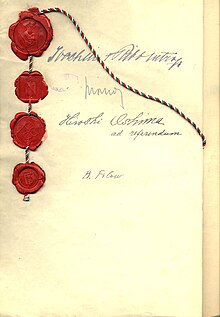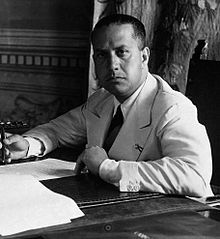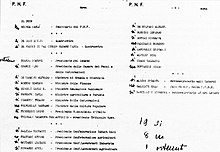Galeazzo Ciano
Gian Galeazzo Ciano ( ), Count of Cortellazzo and Buccari (born March 18, 1903 in Livorno , † January 11, 1944 in Verona ) was an Italian fascist diplomat, politician and son-in-law of Benito Mussolini . Ciano was Minister of Popular Culture from 1935 to 1936 and then Minister of Foreign Affairs of Fascist Italy from 1936 to 1943.
Life


Galeazzo Ciano was the son of Costanzo Ciano , who as a frigate captain of the Italian Navy in World War I commanded the legendary coup described by Gabriele D'Annunzio in the Bay of Bakar . As the son of this later comrade in arms, Benito Mussolini , he also joined the fascists and probably owed his rapid political rise to his marriage to Edda Mussolini , the daughter of Benito Mussolini, in 1930 . He inherited the title of nobility as "Count of Cortellazzo and Buccari" from his father, who was ennobled by King Victor Emanuel for his military services and in 1923 rose to the position of Rear Admiral of the Reserve.
Galeazzo had three children with his wife Edda: the older son Fabrizio, called Ciccino (born 1931 in Shanghai , China), the daughter Raimonda, called Dindina (born 1933 in Rome ) and the younger son Marzio, called Mowgli (after the fictional character by Rudyard Kipling's Jungle Book ), who was also born in Rome in 1937.
Ciano studied law at the University of Rome and entered the diplomatic service in 1925 , initially as Vice Consul in Rio de Janeiro . In 1930, immediately after his marriage, he became the Italian consul general in Shanghai . In his capacity as "special envoy with general authority" in Beijing , Ciano headed a commission of foreign envoys initiated by the League of Nations in 1932 , the task of which was to mediate in the Sino-Japanese conflict .
Recalled to Italy, he became Mussolini's press spokesman in 1933 and Italian minister of propaganda in 1935 . He took part in the Italian-Ethiopian War from 1935 to 1936 as a bomber pilot .
On June 9, 1936, Ciano was appointed Foreign Minister by Mussolini . Ciano followed his instructions willingly, improved relations with the National Socialist German Reich and thus finally initiated the alliance between Germany and Italy ("Berlin-Rome axis") , which was contractually sealed in the so-called steel pact .
From 1938 onwards, however, Ciano began to speak out against too close political ties to Germany. Above all, he condemned German politics after the attack by the German Reich on Poland - not least because Hitler allegedly had not informed Italy about it at all . The fact is, however, that there are secret minutes of August 12, 1939 about a meeting on the Obersalzberg between Hitler and Ciano in the presence of the Reich Foreign Minister von Ribbentrop , with which it can be proven that Ciano gave detailed information about the imminent invasion of German troops in Poland was. When asked by Ciano, Hitler said literally: “Under the prevailing circumstances, Germany's action against Poland can be expected at any moment.” Von Ribbentrop added: “The Russians are, moreover, fully informed about Germany's intentions. I myself informed the Russian chargé d'affaires on behalf of the Führer. ”The conversation continued on August 13, 1939. When Ciano asked about the schedule, Hitler replied that by the end of August 1939 the decision on the Polish matter would have been made. From 1939 to 1943, Ciano was also a member of the Camera dei deputati .
When Ciano wanted to offer the Allies a separate peace in Italy in early 1943 because he could no longer believe in a German " final victory ", there was a break with Mussolini. He dismissed Ciano as foreign minister in February 1943 and pushed him to the post of ambassador to the Holy See .
For his part, Ciano voted on July 24, 1943 in the Fascist Grand Council for the deposition of Mussolini. He then fled with his family to Germany, where he was housed by the Nazis in a villa in Allmannshausen on Lake Starnberg for several weeks. After the disarmament of the Italian troops, the occupation of Italy by the German Wehrmacht and after the reinstatement of Mussolini, he had Ciano arrested. At Mussolini's instigation, Ciano was sentenced to death .
On January 11, 1944, Count Galeazzo Ciano von Cortelazzo was executed by shooting after the Verona show trial because he had voted for Mussolini's deposition. Four other convicts died with him: Marshal De Bono , Giovanni Marinelli , Carluccio Pareschi and the right-wing unionist Luciano Gottardi . The president of the national trade union confederation, Tullio Cianetti , received 30 years imprisonment.
The Diaries ( I Diari di Ciano )
From August 1937, Ciano kept political diaries. These diari were of great historical interest for the Germans and the Allies alike, as they contained a lot of internal information (e.g. conversations with other politicians such as the German ambassador or Foreign Minister Joachim von Ribbentrop ) that reflected the German-Italian relationship at that time and, moreover, provide his assessments of the policies pursued by Mussolini. While Ciano was still imprisoned in Verona, his wife Edda contacted Felizitas Beetz to organize, with her help and that of a family friend, Emilio Pucci , both the escape of Edda and her four children and the transfer of complete copies of the diaries to Switzerland. There the records could then be handed over to the Office of Strategic Services via local middlemen and thus preserved for posterity.
In 1946 the first German edition was published by Scherz Verlag , Bern, for the years 1939 to 1943, with a foreword by Sumner Welles , which was then completed in 1949 by the Hamburg Krüger Verlag with notes from 1937 to 1939.
literature
- Edda M. Ciano: My Truth. As told to Albert Zarca . Weidenfeld & Nicolson, London 1977, ISBN 0-297-77302-X .
- Giordano B. Guerri: Galeazzo Ciano. Una vita (1903-1944) . Mondadori, Milan 2001, ISBN 88-04-48657-0 .
- Andreas Hillgruber: Ciano, Galeazzo . In: Biographical Lexicon on the History of Southeast Europe . Volume 1. Munich 1974, pp. 312-314.
- Tobias Hof: Reluctant rescuers? The Jewish policy of the Italian Foreign Ministry under Galeazzo Ciano 1936 to 1943 . In: Vierteljahrshefte für Zeitgeschichte, vol. 68 (2020), issue 2, pp. 181–216.
- Erich Kuby : Treason in German. How the Third Reich ruined Italy . Ullstein, Frankfurt am Main 1990, ISBN 3-548-34387-2 .
- Ray Moseley: Between Hitler and Mussolini. The double life of Count Ciano . Henschel, Berlin 1998, ISBN 3-89487-311-6 .
- Duilio Susmel: Vita sbagliata di Galeazzo Ciano . A. Palazzi, Milan 1962.
Web links
- Literature by and about Galeazzo Ciano in the catalog of the German National Library
- Newspaper article about Galeazzo Ciano in the 20th century press kit of the ZBW - Leibniz Information Center for Economics .
- Alexander Mühle, Arnulf Scriba: Galeazzo Ciano. Tabular curriculum vitae in the LeMO ( DHM and HdG )
- Galeazzo Ciano - Mussolini's Foreign Minister ( Memento from September 29, 2007 in the Internet Archive ) (CollegeRadio, Bayerischer Rundfunk ; RealAudio )
Individual evidence
- ^ Costanzo Ciano's curriculum vitae , website of the Italian Ministry of Defense (Navy)
- ^ R. Moseley: Between Hitler and Mussolini , pp. 27–56.
- ^ Entry on Galeazzo Ciano in: Dizionario Biografico degli Italiani , Vol. 25, Rome 1981.
- ↑ Edda M. Ciano: My Truth , pp. 99-104.
- ^ Rolf Wörsdörfer: The dandy as a fascist politician . In: Frankfurter Allgemeine Zeitung, January 2, 2013, p. N3.
- ↑ Files on German Foreign Policy 1918–1945, Series D, Volume VII M 70604, page 32 ff, 1946, Ed. Commissioners of the victorious powers USA, GB and France.
- ^ Parliamento Italiano: Galeazzo Ciano
- ↑ Galeazzo Ciano: Diaries 1939/1943 , pp. 507-520.
- ^ Tullio Cianetti with the head of the DAF , Robert Ley ; Federal Archives.
- ↑ Luciano Monzali: La Jugoslavia e l'assetto dell'Europa centrale nella politica estera dell'Italia fascista (1922-1939) . In: Maddalena Guiotto, Wolfgang Wohnout (ed.): Italy and Austria in Central Europe in the interwar period / Italia e Austria nella Mitteleuropa tra le due guerre mondiali . Böhlau, Vienna 2018, ISBN 978-3-205-20269-1 , p. 176 .
- ^ Tobias Hof: The diaries of Galeazzo Ciano . In: Vierteljahrshefte für Zeitgeschichte , vol. 60 (2012), issue 4, pp. 506–528 .
| personal data | |
|---|---|
| SURNAME | Ciano, Galeazzo |
| ALTERNATIVE NAMES | Gian Galeazzo Ciano, Count of Cortellazzo and Buccari |
| BRIEF DESCRIPTION | Italian politician |
| DATE OF BIRTH | March 18, 1903 |
| PLACE OF BIRTH | Livorno |
| DATE OF DEATH | January 11, 1944 |
| Place of death | Verona |

